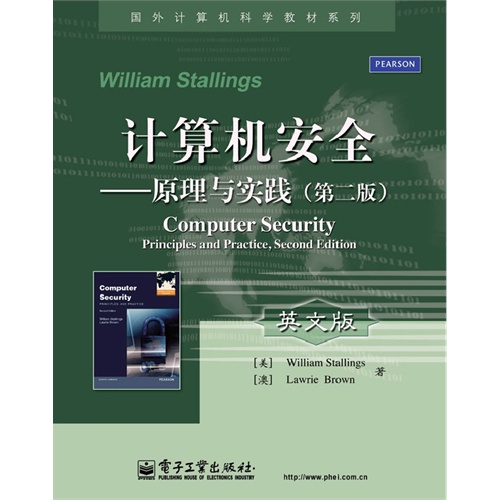
计算机安全-原理与实践-(第二版)-英文版

温馨提示:5折以下图书主要为出版社尾货,大部分为全新(有塑封/无塑封),个别图书品相8-9成新、切口有划线标记、光盘等附件不全详细品相说明>>
- ISBN:9787121200342
- 装帧:一般胶版纸
- 册数:暂无
- 重量:暂无
- 开本:16开
- 页数:810
- 出版时间:2013-04-01
- 条形码:9787121200342 ; 978-7-121-20034-2
本书特色
《国外计算机科学教材系列:计算机安全·原理与实践(第2版)(英文版)》可作为高等院校相关专业计算机安全课程双语教学的教材,同时也是一本有关密码学和计算机网络安全方面的非常有价值的参考书。
内容简介
本书在上一版的基础上进行了修订与更新,全面覆盖了计算机安全领域的相关主题。全书共分为五个部分:**部分——计算机安全技术与原理,概述了支持有效安全策略所必需的技术领域;第二部分——软件安全与可信系统,讲解了软件开发和运行中的安全问题;第三部分——管理问题,主要讨论信息与计算机安全在管理方面的问题;第四部分——密码学算法,给出了各种类型的加密算法和其他类型的密码算法;第五部分——网络安全,重点分析了为网络通信提供安全保障的协议和标准。本书思路清晰、结构严谨,并且提供了大量精心设计的实践问题。
目录
chapter 0 reader's and instructor's guide
0.1 outline of this book
0.2 a roadmap for readers and instructors
0.3 support for cissp certification
0.4 internet and web resources
0.5 standards
chapter 1 overview
1.1 computer security concepts
1.2 threats, attacks, and assets
1.3 security functional requirements
1.4 a security architecture for open systems
1.5 computer security trends
1.6 computer security strategy
1.7 recommended reading and web sites
1.8 key terms, review questions, and problems
part one: computer security technology and principles
chapter 2 cryptographic tools
2.1 confidentiality with symmetric encryption
2.2 message authentication and hash functions
2.3 public-key encryption
2.4 digital signatures and key management
2.5 random and pseudorandom numbers
2.6 practical application: encryption of stored data
2.7 recommended reading and web sites
2.8 key terms, review questions, and problems
chapter 3 user authentication
3.1 means of authentication
3.2 password-based authentication
3.3 token-based authentication
3.4 biometric authentication
3.5 remote user authentication
3.6 security issues for user authentication
3.7 practical application: an iris biometric system
3.8 case study: security problems for atm systems
3.9 recommended reading and web sites
3.10 key terms, review questions, and problems
chapter 4 access control
4.1 access control principles
4.2 subjects, objects, and access rights
4.3 discretionary access control
4.4 example: unix file access control
4.5 role-based access control
4.6 case study: rbac system for a bank
4.7 recommended reading and web site
4.8 key terms, review questions, and problems
chapter 5 database security
5.1 the need for database security
5.2 database management systems
5.3 relational databases
5.4 database access control
5.5 inference
5.6 statistical databases
5.7 database encryption
5.8 cloud security
5.9 recommended reading and web site
5.10 key terms, review questions, and problems
chapter 6 malicious software
6.1 types of malicious software (malware)
6.2 propagation-infected content-viruses
6.3 propagation-vulnerability exploit-worms
6.4 propagation-social engineering-spam e-mail, trojans
6.5 payload-system corruption
6.6 payload-attack agent-zombie, bots
6.7 payload-information theft-keyloggers, phishing, spyware
6.8 payload-stealthing-backdoors, rootkits
6.9 countermeasures
6.10 recommended reading and web sites
6.11 key terms, review questions, and problems
chapter 7 denial-of-service attacks
7.1 denial-of-service attacks
7.2 flooding attacks
7.3 distributed denial-of-service attacks
7.4 application-based bandwidth attacks
7.5 reflector and amplifier attacks
7.6 defenses against denial-of-service attacks
7.7 responding to a denial-of-service attack
7.8 recommended reading and web sites
7.9 key terms, review questions, and problems
chapter 8 intrusion detection
8.1 intruders
8.2 intrusion detection
8.3 host-based intrusion detection
8.4 distributed host-based intrusion detection
8.5 network-based intrusion detection
8.6 distributed adaptive intrusion detection
8.7 intrusion detection exchange format
8.8 honeypots
8.9 example system: snort
8.10 recommended reading and web sites
8.11 key terms, review questions, and problems
chapter 9 firewalls and intrusion prevention systems
9.1 the need for firewalls
9.2 firewall characteristics
9.3 types of firewalls
9.4 firewall basing
9.5 firewall location and configurations
9.6 intrusion prevention systems
9.7 example: unified threat management products
9.8 recommended reading and web site
9.9 key terms, review questions, and prob
作者简介
William Stallings,拥有美国麻省理工学院计算机科学博士学位,现任教于澳大利亚新南威尔士大学国防学院(堪培拉)信息技术与电子工程系。他是世界知名计算机学者和畅销教材作者,已经撰写了17部著作,出版了40多本书籍,内容涉及计算机安全、计算机网络和计算机体系结构等方面,堪称计算机界的全才。他曾九次荣获美国“教材和学术专著作者协会”颁发的“年度*佳计算机科学教材”奖。
-

有限与无限的游戏:一个哲学家眼中的竞技世界
¥37.4¥68.0 -

全图解零基础word excel ppt 应用教程
¥12.0¥48.0 -

机器学习
¥59.4¥108.0 -

深度学习的数学
¥43.5¥69.0 -

智能硬件项目教程:基于ARDUINO(第2版)
¥37.7¥65.0 -

硅谷之火-人与计算机的未来
¥14.3¥39.8 -

元启发式算法与背包问题研究
¥38.2¥49.0 -

AI虚拟数字人:商业模式+形象创建+视频直播+案例应用
¥62.9¥89.8 -

UNIX环境高级编程(第3版)
¥164.9¥229.0 -

剪映AI
¥52.8¥88.0 -

深度学习高手笔记 卷2:经典应用
¥90.9¥129.8 -

纹样之美:中国传统经典纹样速查手册
¥77.4¥109.0 -

UG NX 12.0数控编程
¥24.8¥45.0 -

MATLAB计算机视觉与深度学习实战(第2版)
¥90.9¥128.0 -

界面交互设计理论研究
¥30.8¥56.0 -

UN NX 12.0多轴数控编程案例教程
¥25.8¥38.0 -

微机组装与系统维护技术教程(第二版)
¥37.8¥43.0 -

明解C语言:实践篇
¥62.9¥89.8 -

Linux服务器架设实战(Linux典藏大系)
¥84.5¥119.0 -

PREMIERE PRO 2023全面精通:视频剪辑+颜色调整+转场特效+字幕制作+案例实战
¥69.3¥99.0












